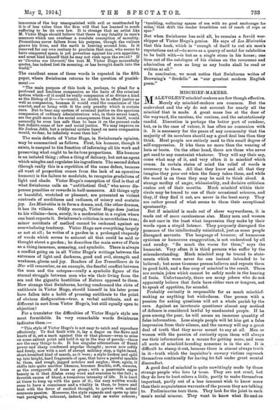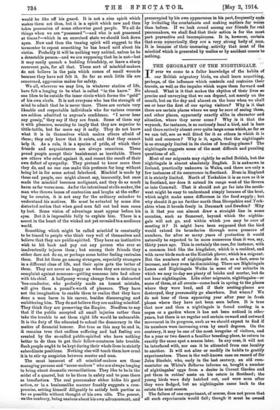MISCHIEF-MAKERS.
MALEVOLENT mischief-makers are few though effective. Merely sly mischief-makers are common. But the malevolent and the sly do not account for nearly all the mischief that is made. A great mass lies at the door of the wayward, the careless, the curious, and the ostentatiously candid. Discretion is perhaps the better part of candour, but, as in the case of valour, it has often no connexion with it. It is necessary for the peace of any community that the majority of its members should say a good deal less than they think. Most people are entirely used to this small degree of self-suppression. It irks them no more than the wearing of hats or boots. On the other hand, there are those who never get used to any constraint whatever. They will say their say, come what may of it, and very often it is mischief which comes. In certain states of mind the relief of words is necessary to them. All that they know and all that they imagine they pour out when the fancy takes them, and while the mood is on them they may be said to think aloud. A strange medley of anger, whimsicality, and derisive criticism rushes out of their mouths. Much mischief within their circle may be traced to one of their occasional seizures, and they, if they find it out, are never in the least sorry. They are rather proud of what seems to them their exceptional spontaneity.
But if mischief is made out of sheer waywardness, it is made out of mere carelessness also. Many men and women do not care in the least what impression they make by their words upon a stupid listener. They purposely disregard the presence of the intellectually uninitiated, just as some people disregard servants. The language of humour, of humorous cynicism or humorous exaggeration, is not understood by all and sundry. "So much the worse for them," says the humorist. Very often it is third persons who suffer by the misunderstanding. Much mischief may be traced to state- ments which were never for one instant intended to be believed; but some tiresome person believes and repeats them in good faith, and a fine crop of mischief is the result. There are certain jokes which cannot be safely made in the hearing of fools. Unfortunately, there are many jokers who do not apparently believe that fools have either ears or tongues, not to speak of appetites, for scandal.
Probably curiosity is responsible for as much mischief- making as anything but wickedness. One person with a passion for asking questions will set a whole pariah by the ears. Against an inveterate questioner almost any method of defence is considered lawful by uneducated people. If he goes among the poor, he will amass an immense quantity of false information. Less simple people will let him get a false impression from their silence, and the unwary will say a great deal of truth that they never meant to say at all. Men or women with the passion of curiosity upon them will always use their information as a means for getting more, and soon all sorts of mischief-breeding nonsense is in the air. It is difficult to stamp it out, because there is almost always truth in it—truth which the inquisitor's unwary victims reproach themselves continually for having let fall under great mental discomfort.
A good deal of mischief is quite unwittingly made by those would be like off his guard. It is not a nice spirit which makes them act thus, but it is a spirit which now and then takes possession of some otherwise good people. We all do things when we are "possessed "—and who is not possessed at times ?—which in an exorcised state we should look down upon. Now and then the teasing spirit will suggest to the tormentor to repeat something be has heard said about his victim. Probably it will be nothing very unkind, unless he be a detestable person—and we are supposing that he is not—but it may easily quench a budding friendship, or leave a sharp recurrent pain, for all that. These sort of mischief-makers do not believe in the pain which comes of small wounds because they have not felt it. So far as such little ills are concerned, aggression makes for safety-
We all, wherever we may live, in whatever station of life, have felt a longing to be what is called "in the know." No one likes to be outside the inner circle which forms the "gold" of his own circle. It is not everyone who has the strength of mind to admit that he is never there. There are certain very likeable and respectable individuals who for various reasons are seldom admitted to anyone's confidence. "I never hear any gossip," they say if they are frank. Some of them say it with pleasure, meaning to imply that they are superior to tittle-tattle, but far more Bay it sadly. They do not know what it is in themselves which makes others afraid of them ; they only know that it exists, and that they cannot help it. As a rule, it is a species of pride, of which their friends and acquaintances are always conscious. These proud people accept their banishment as inevitable. There are others who rebel against it, and resent the result of their own defect of sympathy. They pretend to know more than they do, and no one can make this pretence for long without being let in for some actual falsehood. Mischief is made by these sad people, one might almost say, innocently, but once made the mischief becomes malignant, and they do as much harm as far worse men. As for the intentional strife-maker, the man who throws bones of contention and laughs at the suffer fag he creates, it is not easy for the ordinary onlooker to understand his motives. He must be actuated by some dim distorted notion that when good men fall out bad men come by loot. Some vision of advantage must appear before his eyes. But it is impossible fully to explain him. There is a secret in the heart of the wicked not yet revealed to a mediocre world.
Something which might be called mischief is constantly to be traced to people who think very well of themselves and believe that they are public-spirited. They have an instinctive wish to hit back and pay out any person who ever so inadvertently injures them ; but among their friends they either dare not do so, or perhaps some better feeling restrains them. But let them go among strangers, especially strangers in a different class of life, and their spite gots the better of them. They are never so happy as when they are entering a complaint against someone—getting someone into bad odour with his chief. A halfpenny wrong change from a distracted 'bus-conductor, who probably made an honest mistake, will give them a pound's-worth of pleasure. They have not the imagination to enable them to realize that they have done a man harm in his career, besides discouraging and embittering him. They do not believe they are making mischief. They think they are preserving the Empire. Needless to say that if the public accepted all small injuries rather than take the trouble to set them right life would be unbearable. It is the duty of the educated to school the democracy in the matter of financial honour. But true as this may be and is, it remains true that endless suffering and bad feeling are created by the so-called public-spirited who have nothing better to do than to get their fellow-creatures into trouble. Such people ought to be kept during their whole lives in strictly subordinate positions. Nothing else will teach them bow cruel it is to stir up suspicion between master and man.
The most innocent of all mischief-makers are those managing persons and "scene-makers" who are always longing to bring about dramatic reconciliations. They like to be in the midst of a quarrel, but to be there in safety and to pose there as benefactors. The real peacemaker either hides his good action, or in a businesslike manner frankly suggests a com- promise, setting himself diligently to satisfy both parties as far as possible without thought of his own Me. Tho poseur, on the contrary, being anxious about his own advancement, and preoccupied by his own appearance in his part, frequently ends by irritating the combatants and making matters far worse than before. If we look round among our friends for real peacemakers, we shall find that their action is for the most part preventive and inconspicuous. It is, however, certain that even numerically, they are a very strong body of men. It is be'cansi of their unceasing - activity that most of the mischief which is generated by malice or by accident comes to nothing.















































 Previous page
Previous page